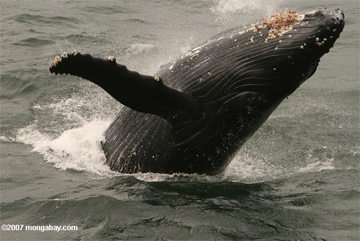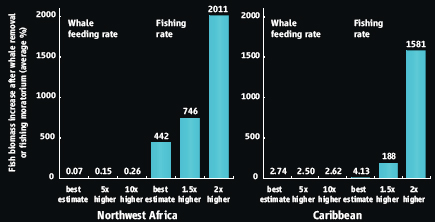New analysis looks at the question: Do whales and humans compete for fish?
Fishermen calling for a resumption of whaling to restore commercial fish stocks are taking the wrong approach, argue researchers writing in the journal Science.
Analyzing data on fish catch and whale abundance off the coast of northwestern Africa and the Caribbean, Leah R. Gerber and colleagues show that fishermen remove far more fish than whales consume, undermining the agreement by whaling nations that whales are driving depletion of fisheries.
 Humpback whale in Alaska |
“Today, the majority of fish stocks and many whale populations are seriously depleted, but most available evidence points toward human overexploitation as the root of the problem,” write the authors. “When developing tropical countries are encouraged to focus on the notion that ‘whales eat fish,’ they risk being diverted from addressing the real problems that their own fisheries face, primarily, overexploitation of their marine resources by distant-water fleets.”
The authors recommend applying ecosystem management concepts to managing whale populations and argue that science, rather than politics, should be an integral component of these discussions.
“Couched in terms of ‘ecosystem management,’ whaling countries, including Japan, advocate the culling of whales as a solution to recover overexploited fish stocks and to increase fishery yield. Some developing countries, which may benefit economically and politically by supporting pro-whaling nations at the International Whaling Commission, have also supported the ‘whales-eat-fish’ assertion.”

Fishermen take more fish than whales
“An effort must be made to actively engage scientists and managers from countries that support Japan’s claims to help them investigate this issue within an ecosystem context in their own regions. In many cases, fisheries officers in tropical areas, such as the Caribbean, do not necessarily believe the whales-eat-fish arguments. Rather, the arguments are endorsed for reasons
related to their aid relationship with Japan, especially in the fisheries sector.”














